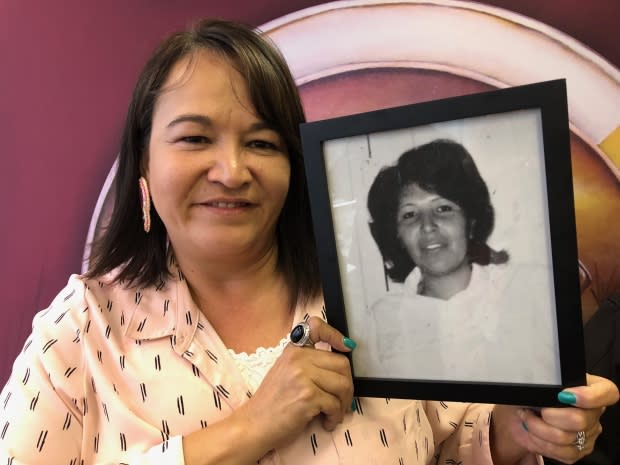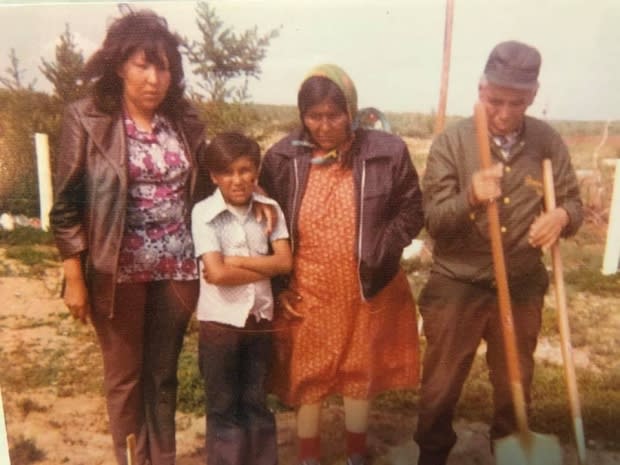'I finally got to meet my mom': 45 years later, Sixties Scoop adoptee learns details of her mother's murder
Christine Merasty never met her mother. But this week, she finally felt like she got to know her — through the details she learned about her mother's murder and the photos found on her body at the time.
Merasty and her husband, along with her cousin and her mother's siblings, met in Winnipeg with two Manitoba RCMP officers to learn for the first time how Clara Dantouze was killed nearly 45 years years ago.
"It's like meeting her. I finally got to meet my mom," said Merasty. "This picture is the first time I am seeing a picture of my mom.… It made me cry."
That framed photo was given to her by the RCMP officers.
Merasty was born on Christmas Day in 1970. Social workers were at the hospital waiting to take her from her 19-year-old mother.
She was adopted out four months later as part of the Sixties Scoop, during which Indigenous children were taken from their families and placed in foster homes or put up for adoption by non-Indigenous families.
"They never contacted my grandparents. My grandparents would have taken me," Merasty said.
"They didn't give my family a chance. I was just given away."
Grief, but no answers
Merasty found her birth family 22 years later and that's when she learned her mother had been murdered.
With her grief came questions that had no answers. All her family knew about Clara's death was that her body was found in a field outside of Winnipeg in 1973.
"My late mom, she kept talking about our late sister," said Joe Dantouze, Clara's younger brother.
"She was grieving all these years and she would cry.… That is how she lived her life, until she passed away."

Dantouze said he doesn't remember Clara very well. He was a young boy when she came home from residential school in Cross Lake, Man., but she then moved to Winnipeg and would come back to the family's northern Manitoba home in Brochet occasionally to visit.
Dantouze was home when police delivered the devastating news about his sister. He said police never came back to tell the family any more.
His parents died without ever knowing how Clara died or if justice had been served.
'Families are left without knowing'
It was Merasty who started digging. She said she found two newspaper articles about her mother's death, including one about the man who was arrested and jailed in connection with her death.
But she said she wanted to know why this information never made it north to her grandparents.
She turned to Hilda Anderson-Pyrz, a liaison for the families of missing and murdered Indigenous women and girls, for help connecting with RCMP.
"I'm learning about a lot of historical cases — a prime example with Christine's family, that's over 40 years old," said Anderson-Pyrz, who works for Manitoba Keewatinowi Okimakanak.
She said communication between police and families, especially those in isolated communities, has historically been poor.
"They didn't notify them about what happened or the court process or the outcome," she said. "Their families are left without knowing, and it's important to know and have that closure and healing and to be able to go forward."
On Wednesday, Anderson-Pyrz co-ordinated the meeting between Merasty and her family with RCMP.
Nearly 45 years after Clara's death, they came together in Winnipeg, on the 16th floor of MKO's Portage Avenue office.

"What we heard was, she and my dad, they had an argument, and she went out and she met the man who murdered her [at] a bar on Main Street," said Merasty.
"[The RCMP] also shared where she was found and the date."
Merasty said her mother died of exposure after being beaten and left in a field east of Winnipeg.
The family finally learned a man was arrested two years later, in 1975. He pleaded guilty to manslaughter in 1976 and was sentenced to 12 years in prison.
'I know what happened and I am glad'
For Dantouze and his older sister, Theresa Dettanikkeazhe, it was the first time they heard these details.
"Just like yesterday it happened," said Dettanikkeazhe. "I hope I can go on from now and feel better. I know what happened and I am glad."
The family said they appreciate the meeting with officers and were surprised when police gave them two photos that were on Clara at the time of her death. One showed Clara, Joe and their parents in Brochet. The other was of her best friend's children.
RCMP Staff Sgt. Daniel Barnabe was one of the officers who met with the family. He is also the officer in charge of Project Devote, the province's missing and murdered Indigenous women's task force.
He says the closed homicide file, which included the photos, was held in archives in Ottawa, and was re-examined after Clara's family testified at the missing and murdered Indigenous women and girls inquiry hearings.
"As soon as investigators with the Manitoba RCMP were advised that photos of Clara existed, we began the process so that they could be immediately returned to her family," he said in a statement emailed to CBC News.
"It was our hope that by returning the photos to the family as well as by sharing information about the investigation, we could help in their continued journey of healing."
The Manitoba RCMP now has a full-time employee to communicate with the families of missing or murdered people, Staff Sgt. Barnabe said.
"The family liaison is critical to current investigations as they provide families with regular updates, information, support services and referrals to community agencies," he said.
Clara Dantouze's family has visited the spot where Clara's body was found, where they said prayers and left a rosary that belonged to their late mother.
They hope to get permission to place a cross at that location, so her story never goes untold again.

